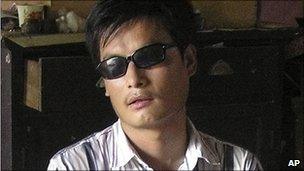Blind activist Chen Guangcheng 'freed in China'
- Published

Mr Chen, who has no formal legal training, became known as the "barefoot lawyer"
A blind activist jailed after revealing rights abuses under China's one-child policy has been freed after a four-year prison term, rights groups say.
Chen Guangcheng accused officials in Shandong province of forcing 7,000 women into abortions or sterilisations.
Chinese Human Rights Defenders said he was released from jail in the city of Linyi, where he had helped people sue over the injustices.
Mr Chen, 39, is a contender for this year's Nobel Peace Prize.
Mr Chen, who lost his sight in childhood, has no formal legal training as the blind were not permitted to attend college.
He has also advised farmers in land disputes and campaigned for improved treatment of the disabled.
International criticism
The BBC was unable to immediately contact relatives of Mr Chen or his lawyer to confirm his release.
However, activist lawyer Teng Biao told the BBC he had received a text message from an unknown source confirming that Mr Chen had been freed.
"I have not changed at all... I want to thank all the friends who have been concerned about me," Mr Chen was quoted as saying by the Chinese Human Rights Defenders, external on his release.
Mr Chen was reportedly escorted to his village early on Thursday. He is said to be weak and thin, and is suffering from chronic gastroenteritis.
Human rights groups say that although Mr Chen has been freed he is likely to remain under tight guard by the authorities.
His family has been under close surveillance and the mobile and landline phones services of several relatives have been cut, his relative Yin Dongjiang told the Associated Press.
"There's a lot of people in the village right now and the family isn't allowed to leave their home," said Mr Yin was quoted as saying.
Mr Chen was sentenced to four years and three months in prison after being convicted of damaging property and disrupting traffic.
The charges were made after a rally by supporters of Mr Chen who were angered by police treatment of him.
Supporters clashed with police during the rally outside Mr Chen's home while he was under house arrest in 2006.
The sentence drew international criticism, with campaigners and supporters claiming that the prosecution was politically motivated.